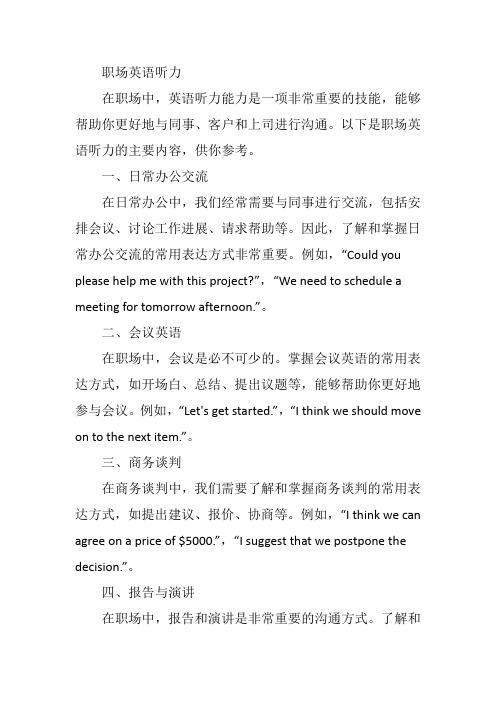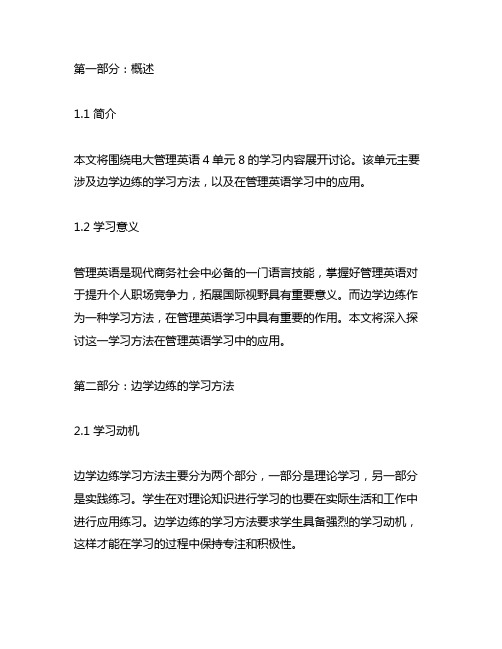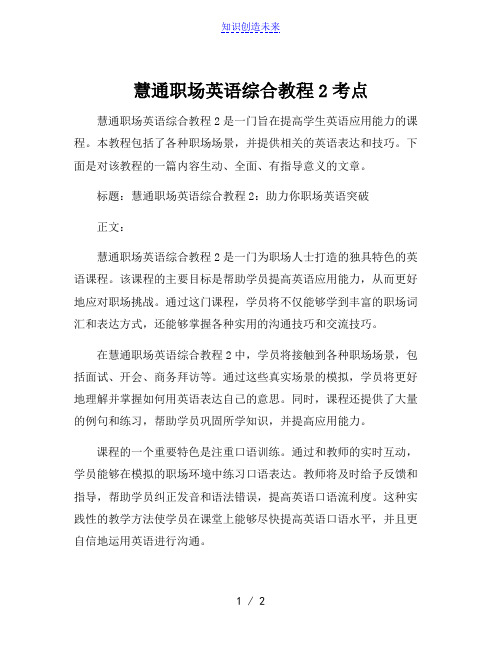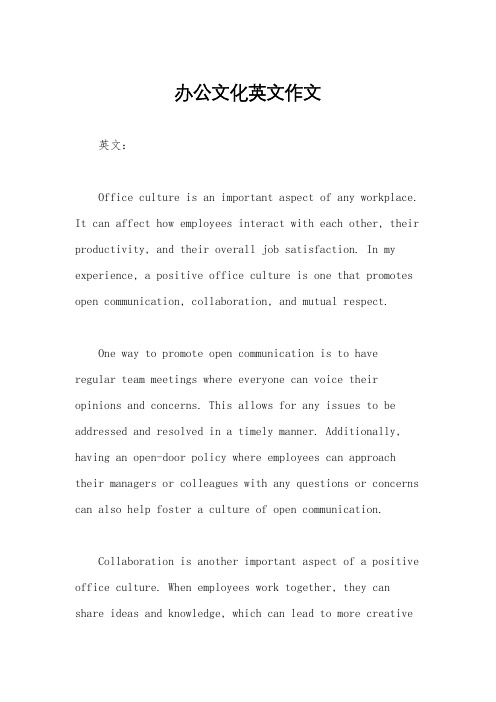职场英语:不同文化背景的人对工作的理解不同
职场英语听力

职场英语听力在职场中,英语听力能力是一项非常重要的技能,能够帮助你更好地与同事、客户和上司进行沟通。
以下是职场英语听力的主要内容,供你参考。
一、日常办公交流在日常办公中,我们经常需要与同事进行交流,包括安排会议、讨论工作进展、请求帮助等。
因此,了解和掌握日常办公交流的常用表达方式非常重要。
例如,“Could you please help me with this project?”,“We need to schedule a meeting for tomorrow afternoon.”。
二、会议英语在职场中,会议是必不可少的。
掌握会议英语的常用表达方式,如开场白、总结、提出议题等,能够帮助你更好地参与会议。
例如,“Let's get started.”,“I think we should move on to the next item.”。
三、商务谈判在商务谈判中,我们需要了解和掌握商务谈判的常用表达方式,如提出建议、报价、协商等。
例如,“I think we can agree on a price of $5000.”,“I suggest that we postpone th e decision.”。
四、报告与演讲在职场中,报告和演讲是非常重要的沟通方式。
了解和掌握报告与演讲的常用表达方式,如开场白、主体内容、结论等,能够帮助你更好地进行沟通和表达。
例如,“In this report, I will focus on the marketing strategies we implemented last year.”,“I hope you enjoyed my presentation.”。
五、跨文化沟通在职场中,与来自不同文化背景的人进行沟通是非常常见的。
了解和掌握跨文化沟通的常用表达方式,如礼貌用语、文化差异等,能够帮助你更好地与不同文化背景的人进行沟通和交流。
人员混同的英语地道表达

人员混同的英语地道表达在日常交流中,尤其是在职场环境中,准确地表达人员混同的概念至关重要。
本文将介绍一些实用的英语地道表达,以帮助您更好地应对此类场景。
一、问题背景及重要性在多元文化的环境中,人员混同是一个常见现象。
不同国籍、种族、性别和文化背景的员工共同组成一个团队,使得沟通变得更加复杂。
因此,掌握相关地道表达是顺利开展工作的前提。
二、人员混同的英语地道表达1."Diversity in the workplace": 此表达指的是在工作场所中存在的各种差异,如种族、性别、年龄和文化等。
2."Cultural fusion": 这个词描述了不同文化间的交融,可用来表达人员混同的情况。
3."Mixed crowd": 这个词用来形容一个场合中有着不同背景的人群。
4."Random assortment of people": 此表达描述了一个随机组合的人群,可用于形容人员混同的场合。
5."Multicultural mix": 这个词组强调了多元文化背景下的混合。
三、具体场景下的运用1.介绍团队时:在一个多元文化的团队中,您可以这样介绍:"Our team is a diverse mix of individuals with various backgrounds, skills, and experiences."(我们的团队是一个有着各种背景、技能和经验的多样化组合。
)2.谈论活动参与者:如果您要描述一个活动吸引了不同背景的人,可以这样说:"The event attracted a mixed crowd of locals and foreigners, young and old."(此次活动吸引了本地人和外国人、年轻人和老年人的混合。
)3.描述项目合作:在谈论一个涉及多元文化合作的项目时,您可以使用:"This project is a cultural fusion of ideas and expertise from various disciplines and countries."(这个项目是各种领域和国家间的理念和专长的文化融合。
电大管理英语4单元8边学边练

第一部分:概述1.1 简介本文将围绕电大管理英语4单元8的学习内容展开讨论。
该单元主要涉及边学边练的学习方法,以及在管理英语学习中的应用。
1.2 学习意义管理英语是现代商务社会中必备的一门语言技能,掌握好管理英语对于提升个人职场竞争力,拓展国际视野具有重要意义。
而边学边练作为一种学习方法,在管理英语学习中具有重要的作用。
本文将深入探讨这一学习方法在管理英语学习中的应用。
第二部分:边学边练的学习方法2.1 学习动机边学边练学习方法主要分为两个部分,一部分是理论学习,另一部分是实践练习。
学生在对理论知识进行学习的也要在实际生活和工作中进行应用练习。
边学边练的学习方法要求学生具备强烈的学习动机,这样才能在学习的过程中保持专注和积极性。
2.2 学习步骤边学边练的学习方法主要包括以下几个步骤:首先是理论学习,学生需要通过课堂、教材或者其他途径获取管理英语的理论知识。
其次是实践练习,学生需要在实际生活和工作中应用所学的管理英语知识,通过模拟情境或者真实场景进行练习。
最后是反馈总结,学生需要及时总结实践练习的经验教训,发现问题并加以改进。
2.3 学习心态边学边练的学习方法要求学生保持积极的学习心态,要有耐心和毅力。
在实践练习中可能会遇到困难和挫折,但学生需要保持乐观的心态,相信自己能够不断提升和进步。
学生需要具备扎实的基础知识,只有掌握了管理英语的基础知识,才能在实践中灵活运用。
第三部分:边学边练在管理英语学习中的应用3.1 提高语言表达能力通过边学边练的学习方法,学生可以在实践练习中不断提高自己的语言表达能力。
在商务会议中,学生可以结合所学的管理英语知识,进行角色扮演或者模拟对话,从而提高自己在英语环境下的表达能力。
3.2 培养团队协作能力在边学边练的学习方法中,学生可以选择与他人合作进行实践练习,从而培养团队协作能力。
通过与他人的合作,学生不仅可以互相帮助解决问题,而且在实践中还能学习到团队合作的技巧和方法,提高自己的团队协作能力。
全国职场英语

全国职场英语职场英语是指在工作环境中使用的英语,它是不可忽视的一门技能,尤其对于进入全球化的职场来说。
越来越多的企业要求员工具备良好的英语沟通能力,不仅仅是为了与外国客户交流,更是为了与不同地区、不同文化背景的同事进行有效沟通。
因此,全国范围内的职场英语的学习和提高显得尤为重要。
职场英语的重要性1.全球化趋势:随着全球化的发展,越来越多的企业与国外企业进行合作。
良好的职场英语能力可以帮助员工与外国客户进行高效、无障碍的交流,为企业合作提供便利。
2.跨文化交流:在全国范围内工作的企业,往往有来自不同地区、不同文化背景的员工。
职场英语的学习可以帮助员工更好地与同事进行交流,解决沟通障碍,促进团队合作。
3.拓宽职业发展空间:掌握职场英语不仅可以提高个人在跨国企业中的竞争力,还可以拓宽职业发展的空间,为个人的职业规划打下坚实的基础。
职场英语学习的方法1.学习课程:职场英语的学习需要有系统的课程指导,可以选择参加线下或线上的英语培训课程,通过课堂学习来提升自己的英语水平。
这些课程通常包括听力、口语、阅读和写作等内容,帮助学员全面提升英语能力。
2.自主学习:除了参加课程外,个人也可以自主学习职场英语。
可以利用网络资源,如英语网站、学习平台、英语学习App等,进行灵活的学习。
可以通过听英文音频、阅读英文文章、与外国朋友交流等方式来提升自己的英语水平。
3.参加英语角或英语俱乐部:参加英语角或英语俱乐部可以提供一个与他人练习英语的机会。
在这样的场合,可以与其他人进行英语对话,共同提高英语口语表达能力。
4.多与外国员工沟通:如果在工作中有机会与外国员工合作,可以多与他们交流,练习英语口语和听力。
可以请他们指正自己的发音和语法错误,这对于积极改善自己的英语母语化水平非常有帮助。
职场英语的常见用语在职场英语中,有一些常见的用语和表达方式,下面列举了一些例子:1.Greetings(问候语)•。
misunderstandings英语解释 -回复

misunderstandings英语解释-回复什么是misunderstandings(误解)?Misunderstandings(误解)是指在人际交往中,由于一方或多方的错误推断、理解不准确或信息传递不清楚而导致的误解和不当的处理。
这是一种常见的沟通问题,可能发生在各种场合和关系中,如个人关系、职场环境、国际交流等。
解决误解往往需要耐心、敏感度和有效的沟通技巧。
误解可能是由于不同的语言、文化、背景或知识水平导致的。
人们从不同的视角和经验中了解事物,因此对于同一信息的理解可能存在差异。
此外,误解也可能源于沟通方式不当,包括言辞不慎、非语言信号的解读有误、互相的预期不一致等。
这些误解可能会导致不必要的紧张、冲突和困惑。
为了避免和解决误解,以下是一些方法可以采用:1. 识别误解的征兆:当感到困惑、不满意或有疑问时,应及时意识到可能存在误解的情况。
主动询问对方是否理解自己的意思,或者双方可以进行互动以更好地理解彼此的立场。
2. 倾听和尊重对方观点:要尊重他人的观点和经历,在发表自己的意见之前,理解对方的观点。
要提醒自己,他人的观点可能是基于不同的经验背景,因此不同的理解是正常的。
3. 用简单明了的语言交流:避免使用复杂的词汇和句子结构,特别是在跨文化交流中。
使用一些通用的词汇和简单的句子可以减少可能的误解。
4. 尽量明确表达:确保自己清楚明确地传达信息。
重要的是明确表达自己的意图、需要和期望,以便他人能够准确理解。
可以使用简洁明了的语言、图示、示例等方式来帮助清晰传达。
5. 注意非语言交流:沟通并不仅仅通过言辞进行,非语言信号如面部表情、姿势和声音的调子也会传递信息。
确保自己的非语言沟通与言语信息一致,避免造成误导。
6. 及时澄清误解:当发现误解时,要及时肯定并澄清。
如果对方对信息或意图有错误的理解,应耐心解释并提供更多的背景信息。
保持开放和友好的态度,有助于解决误解。
7. 协商和妥协:有时候,误解可能由于双方对待问题的态度和期望不一致而导致。
职场英语口语速成课程

职场英语口语速成课程
职场英语口语速成课程是一门旨在帮助职场人士快速提高英语口语能力的课程。
以下是职场英语口语速成课程的一些学习内容:
1. 职场常用英语口语:学习在职场上常用的英语表达方式和词汇,包括商务会议、邮件、报告、电话等场合的常用语。
2. 商务礼仪和沟通技巧:学习商务礼仪和沟通技巧,包括如何与同事、客户和上司进行有效的沟通,以及如何建立良好的人际关系。
3. 听力训练:通过听录音、看视频等方式训练听力,提高对英语的理解能力。
4. 口语练习:通过模拟场景、角色扮演等方式进行口语练习,提高口语表达能力和自信心。
5. 文化背景知识:学习西方文化和职场文化,了解不同国家和地区的商务习惯和礼仪,以便更好地融入国际化的工作环境。
通过职场英语口语速成课程的学习,职场人士可以快速提高英语口语能力,更好地与国际同事和客户进行交流,提升个人和企业的竞争力。
慧通职场英语综合教程2考点

慧通职场英语综合教程2考点慧通职场英语综合教程2是一门旨在提高学生英语应用能力的课程。
本教程包括了各种职场场景,并提供相关的英语表达和技巧。
下面是对该教程的一篇内容生动、全面、有指导意义的文章。
标题:慧通职场英语综合教程2:助力你职场英语突破正文:慧通职场英语综合教程2是一门为职场人士打造的独具特色的英语课程。
该课程的主要目标是帮助学员提高英语应用能力,从而更好地应对职场挑战。
通过这门课程,学员将不仅能够学到丰富的职场词汇和表达方式,还能够掌握各种实用的沟通技巧和交流技巧。
在慧通职场英语综合教程2中,学员将接触到各种职场场景,包括面试、开会、商务拜访等。
通过这些真实场景的模拟,学员将更好地理解并掌握如何用英语表达自己的意思。
同时,课程还提供了大量的例句和练习,帮助学员巩固所学知识,并提高应用能力。
课程的一个重要特色是注重口语训练。
通过和教师的实时互动,学员能够在模拟的职场环境中练习口语表达。
教师将及时给予反馈和指导,帮助学员纠正发音和语法错误,提高英语口语流利度。
这种实践性的教学方法使学员在课堂上能够尽快提高英语口语水平,并且更自信地运用英语进行沟通。
除了口语训练,慧通职场英语综合教程2还注重写作和听力训练。
通过训练听力,学员能够更好地理解母语为英语的人士在职场环境中的表达。
通过练习写作,学员能够提高自己的书面表达能力,写出更加流畅、准确的英语文档。
此外,课程还注重培养学员的跨文化交际能力。
在全球化的背景下,职场中的跨文化交际已经成为一项重要的技能。
慧通职场英语综合教程2通过让学员了解不同文化背景下的沟通方式和习惯,帮助学员更好地应对跨文化交流的挑战。
这将有助于学员在国际化的职场中更加自如地与各种文化背景的人士合作。
综上所述,慧通职场英语综合教程2作为一门全面、实用的职场英语课程,将为学员提供丰富的职场词汇和表达方式,并帮助他们掌握各种实用的沟通技巧和交流技巧。
通过这门课程的学习,学员将能够提升自己在职场中的英语应用能力,为职业发展打下坚实的基础。
办公文化英文作文

办公文化英文作文英文:Office culture is an important aspect of any workplace. It can affect how employees interact with each other, their productivity, and their overall job satisfaction. In my experience, a positive office culture is one that promotes open communication, collaboration, and mutual respect.One way to promote open communication is to have regular team meetings where everyone can voice their opinions and concerns. This allows for any issues to be addressed and resolved in a timely manner. Additionally, having an open-door policy where employees can approach their managers or colleagues with any questions or concerns can also help foster a culture of open communication.Collaboration is another important aspect of a positive office culture. When employees work together, they can share ideas and knowledge, which can lead to more creativeand innovative solutions. This can be encouraged by having team-building activities or projects that require employees to work together towards a common goal.Finally, mutual respect is crucial in any workplace. This means treating everyone with dignity and recognizing their contributions to the team. One way to promote mutual respect is to recognize and celebrate employee achievements, whether it be through a simple thank you or a more formal recognition program.Overall, a positive office culture can lead to a more productive and satisfying work environment. By promoting open communication, collaboration, and mutual respect, employees can feel valued and motivated to contribute tothe success of the team.中文:办公室文化是任何工作场所的重要方面。
- 1、下载文档前请自行甄别文档内容的完整性,平台不提供额外的编辑、内容补充、找答案等附加服务。
- 2、"仅部分预览"的文档,不可在线预览部分如存在完整性等问题,可反馈申请退款(可完整预览的文档不适用该条件!)。
- 3、如文档侵犯您的权益,请联系客服反馈,我们会尽快为您处理(人工客服工作时间:9:00-18:30)。
A new article in a special section on Culture and Psychology in Perspectives on Psychological Science, a journal of the Association for Psychological Science, explains that people in different cultures think about work in different ways.
For example, people have different expectations about teamwork, says Cristina B. Gibson, of the University of Western Australia.
Gibson has interviewed people to understand how they conceptualize teams. “In the US, people used a lot of sports metaphors. Elsewhere, that just wasn't a common metaphor.” In Latin America, for example, many people talked about the work team as a family.
“If you just use those two contrasts and think about what you might expect from your family versus what you might expect from your sports team, you start to see the differences.” Families are involved in all parts of your life, and are expected to celebr ate with you socially. “Your involvement in your sports team is m ore limited. Less caretaking, more competitive.”
Another example is in the realm of leadership. Many people assume that charismatic leadership is a good thing - using a strong personality to inspire loyalty in others. But that's not going to work for everyone, Gibson says. “The very same behaviors that are deemed desirable from a leader in one culture might be viewed as interference or micromanagement in other settings.”
And as this research continues, she says, people should consider that cultures can vary a lot within countries, too, especially as large numbers of people continue to migrate between countries. “We can’t make these assumptions that everybody in the US is like this and everybody in China is like that.”
More:面试英语学习资料/study-interview.html。
